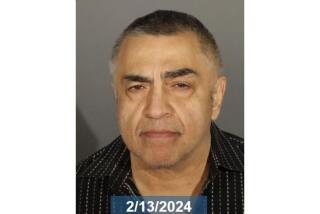IRS Seizure of Car Dealership: the Neighbors Saw It Coming
- Share via
As Mercedes-Benzes, Corvettes, BMWs and Jaguars were towed Friday from a La Cienega-Cadillac Avenue car dealership seized the day before by the Internal Revenue Service, neighborhood onlookers said they were not surprised by allegations that drug dealers were regular customers.
“It was obvious,” said one 20-year-resident who, declining to give his name, explained that many welfare recipients live in the surrounding blocks. “It would be like Bloomingdale’s in the heart of Watts, like a welfare office in Beverly Hills, like caviar and ketchup.”
But one nearby store owner wondered why the dealership was singled out for simply doing business.
“I don’t think anything was going on except that drug dealers were buying cars,” said the business owner, who also declined to give his name. “These agents are harassing businessmen in order to crack down on these drug dealers. It doesn’t feel right.”
But Earl Acquaviva, chief of the IRS Criminal Investigation Division, said that the dealership, AMS Auto Sales at 2045 La Cienega Blvd., represents part of the large, underground, cash-only economy that is fed by the drug trade. AMS, he said, provided a money-laundering service to drug dealers who paid cash for $50,000 luxury autos that they could then resell.
“One informant said this was the place to come to get your car if you were a drug dealer,” Acquaviva said. “You could get a car for cash or for drugs.”
Three people arrested Thursday at the dealership--Ahmad Reze Vosoughi, 32, Majid Ghassemieh, 33, and Sorena Meshgani Solati, 34--pleaded not guilty Friday in federal court to 16 charges of conspiracy, money laundering, filing false income tax forms and failure to file IRS Form 8300.
Bail for Solati was set at $250,000, and Vosoughi and Ghassemieh were held without bail.
The 8300 form requires that a record be filed with the IRS of all cash transactions totaling $10,000 or more. Although the car dealership filed some of the required forms, many were filled out with false names and car serial numbers, Acquaviva alleged. Many of the forms lacked adequate information to trace those involved in the financial deals, he said.
The seizure and arrest represents the first major “8300 case” in the Western United States, Acquaviva said.
IRS agents two years ago were tipped off to the dealership by informants and by California Highway Patrol officers who allegedly stopped known drug dealers driving cars from AMS, he said. IRS auditors then examined computerized 8300 forms from the dealership. Meanwhile, IRS agents began surveillance and undercover operations.
According to an affidavit filed in support of a search warrant, one informant told investigators that Vosoughi claimed that almost all of the customers who bought cars at AMS were narcotics dealers. In addition, the informant claimed to have sold 100 kilograms--more than 200 pounds--of cocaine to AMS customers from 1985 through 1987.
Another informant claimed to have been offered cocaine by Ghassemieh on a trade-in of an expensive car for a cheaper one.
The dealership represents part of the huge, underground cash economy supported by the drug trade, Acquaviva said. A measure of that growing economy are Federal Reserve Bank figures for Southern California’s cash surplus, or the amount of money turned into banks. In 1985, the amount totaled $165.8 million. Last year, the figure was $3.4 billion.
Federal agents have found that some businesses involve themselves in the drug economy by selling expensive electronic equipment, satellite dishes, furniture, jewelry and vacation packages for cash only.
“A lot of businesses run pure cash,” Acquaviva said. “The underground economy has been around for a long time.”’ On Friday, Acquaviva stood in the car dealership office as phones rang nonstop. Outside on the lot, tow truck crews worked to pull out 40 cars and a 25-foot power boat for transfer to the U.S. marshal’s impound lot.
Two dealerships and one individual already had complained earlier Friday that their cars had been placed on the lot by consignment and were not owned by AMS, Acquaviva said. Once state Department of Motor Vehicles records are checked, the cars will be returned to the legal owners, he said. Those owned by AMS will be kept by the federal government and sold to agencies that might use them for undercover operations, he added.
But one unhappy Mercedes owner, who declined to give his name, worried that his car might be held by the government for as long as six months.
“I need to sell it; I need the money,” the man said as he stood outside the chained fence around the dealership.
Friends had told him that the dealership sold exotic cars and he had brought his 1984 Mercedes to AMS only last week.
“That’s my luck,” he said.






